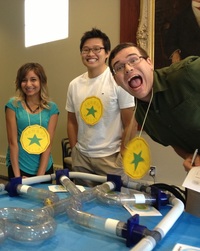Why do we still view collaboration as 'cheating'? A UCLA Prof's experiment in game theory.2/28/2015 Recently an article was being shared in education and social media circles called “Why I let my students cheat on an exam”, by UCLA Behavioral Ecology professor Peter Nonacs. This prof cleverly decided to allow students to live the concepts of animal behaviour and game theory by working through tough problems TOGETHER, in a real-life game theory situation, rather than by memorizing and (superficially) applying key concepts. He explains: Much of evolution and natural selection can be summarized in three short words: ‘Life is games.’ ” In any game, the object is to win – be that defined as leaving the most genes in the next generation, getting the best grade on a midterm, or successfully inculcating critical thinking into your students… Games can determine why ant colonies do what they do, how viruses evolve to exploit hosts, or how human societies organize and function. He decided to essentially ‘flip’ the test, giving them resources ahead of time, and then allowing them to use those resources for the test itself. Students were asked to come up with the test rules as a class. In short, by traditional standards, they would be allowed to cheat. But he did let them know that this would also be the toughest test he had given. So how did students respond? As Nonacs described, they spent the whole week “living game theory”: Once the shock wore off, they got sophisticated. In discussion, they speculated, organized and plotted. What would be the test’s payoff matrix? Would cooperation be rewarded or counter-productive? Would a large group work better or smaller sub-groups? What about ‘scroungers’ who didn’t study but were planning to parasitize everyone else’s hard work? The day of the test, only one question was assigned: “If evolution through natural selection is a game, what are the players, teams, rules, objectives, and outcomes?”. Leaders emerged in the class, ideas were vetted and the majority of the group decided to move forward with their proposed answers as one team, with three “lone wolves” deciding to go it alone. For what it’s worth, the shared grade was significantly higher for the majority of students in the class. Nonacs summarizes the key takeaway for students: In the end, the students learned what social insects like ants and termites have known for hundreds of millions of years: cooperation is better than competition. Unity that arises through a diversity of opinion is stronger than any solitary competitor… they were changing their goal in the Education Game from ‘Get a higher grade than my classmates, to ‘Get to the best answer’. Shifting focus from grades to real learning? Not bad for a little game time.
0 Comments
Leave a Reply. |
Categories
All
AuthorA passionate educator.. on a quest for a schooling model to love! Archives
August 2017
|


 RSS Feed
RSS Feed
